Monday night’s municipal debates organized by the League of Women Voters Greenwich, the first of the season, featured four candidates for the three-member Board of Selectmen.
Incumbent Republican Fred Camillo, who seeks a fourth 2-year term as Greenwich’s First Selectman, debated Democratic candidate Anthony Moor.
Mr. Moor is the father of two adult children who moved to central Greenwich with his wife five years ago. Moor had a decades long career as a broadcast news reporter “from the Walter Cronkite tradition,” and later managed software product development at major companies. He serves on the RTM where he chairs the transportation committee.
Before becoming First Selectman, Camillo a lifelong Greenwich resident, served as a State Rep in the 151st district for 11 years, and previously served on the RTM and on the Parks & Rec board. He owned Camillo Carting and Recycling, and for a time worked as a mortgage broker and as a social studies teacher at Port Chester High School.
Camillo said as a an incumbent he should be judged by his record, his vision, and his word, and that under his tenure the town had ranked as one of the safest in the country and one of the most desirable places to live.

Melissa McClammy, 2025-2026 LWV Greenwich president, welcomed attendees to the full town hall meeting room for Selectmen debates. Sept 29, 2025 Photo: Leslie Yager
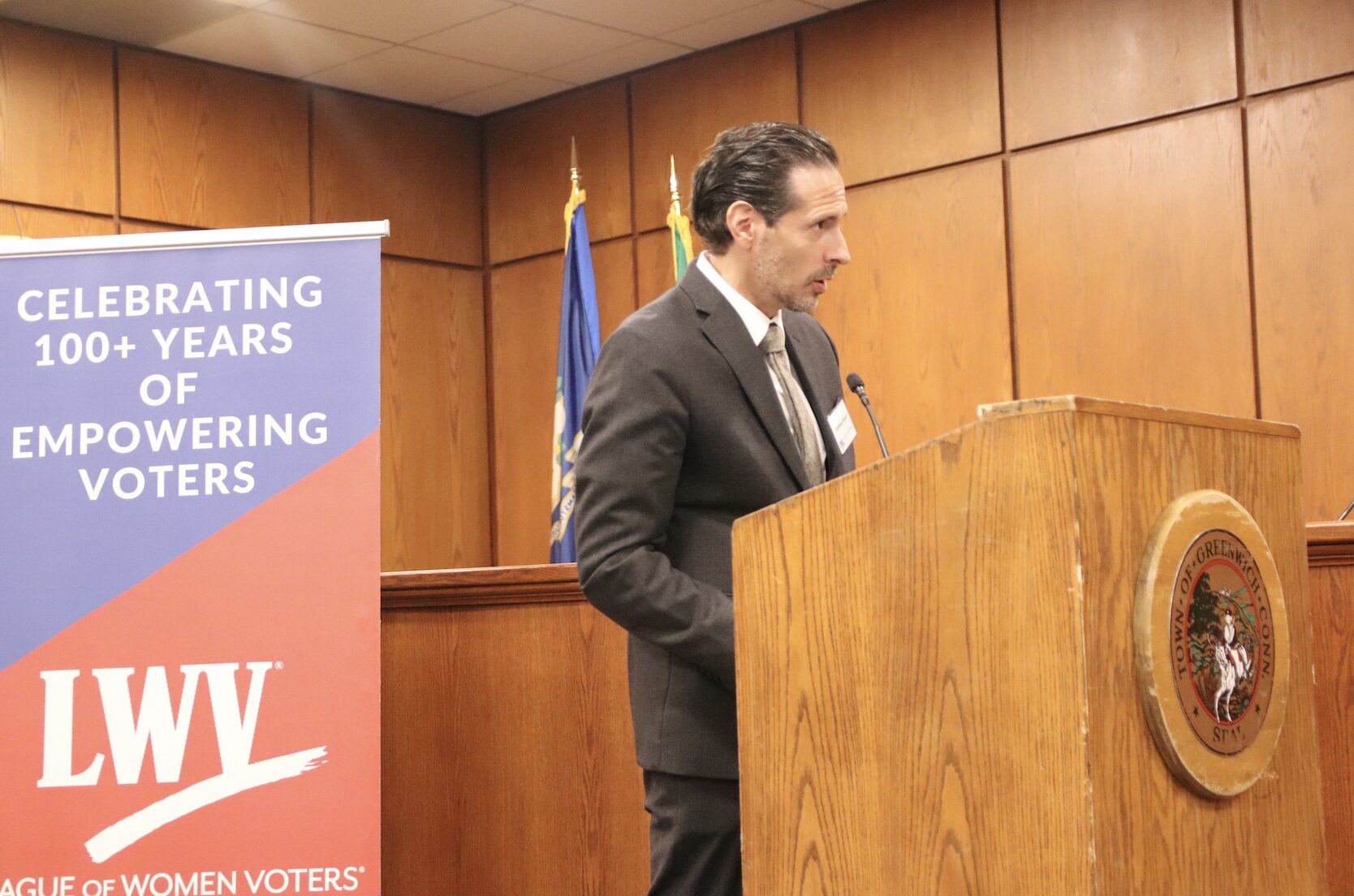
Anthony Presta, a Witon High school teacher, Wilton resident in Wilton and an unaffiliated voter, moderated the Selectmen debate. Sept 29, 2025 Photo: Leslie Yager
The debates were sold out, with a waiting list beforehand so that every seat was filled 15 minutes before the 7pm start time, and those who did not have a seat in person could watch the the debates via GCTV’s Youtube channel.
The audience for the debate was quiet and polite, and the moderator, Anthony Presta who is a teacher and unaffiliated voter from Wilton, assisted by Greenwich High School senior Maya Coplin, took turns asking questions derived from audience suggestions prior to the event.
Unlike some contentious debates of the past, the pace Monday night was more of a slow boil with emotions slowly rising.
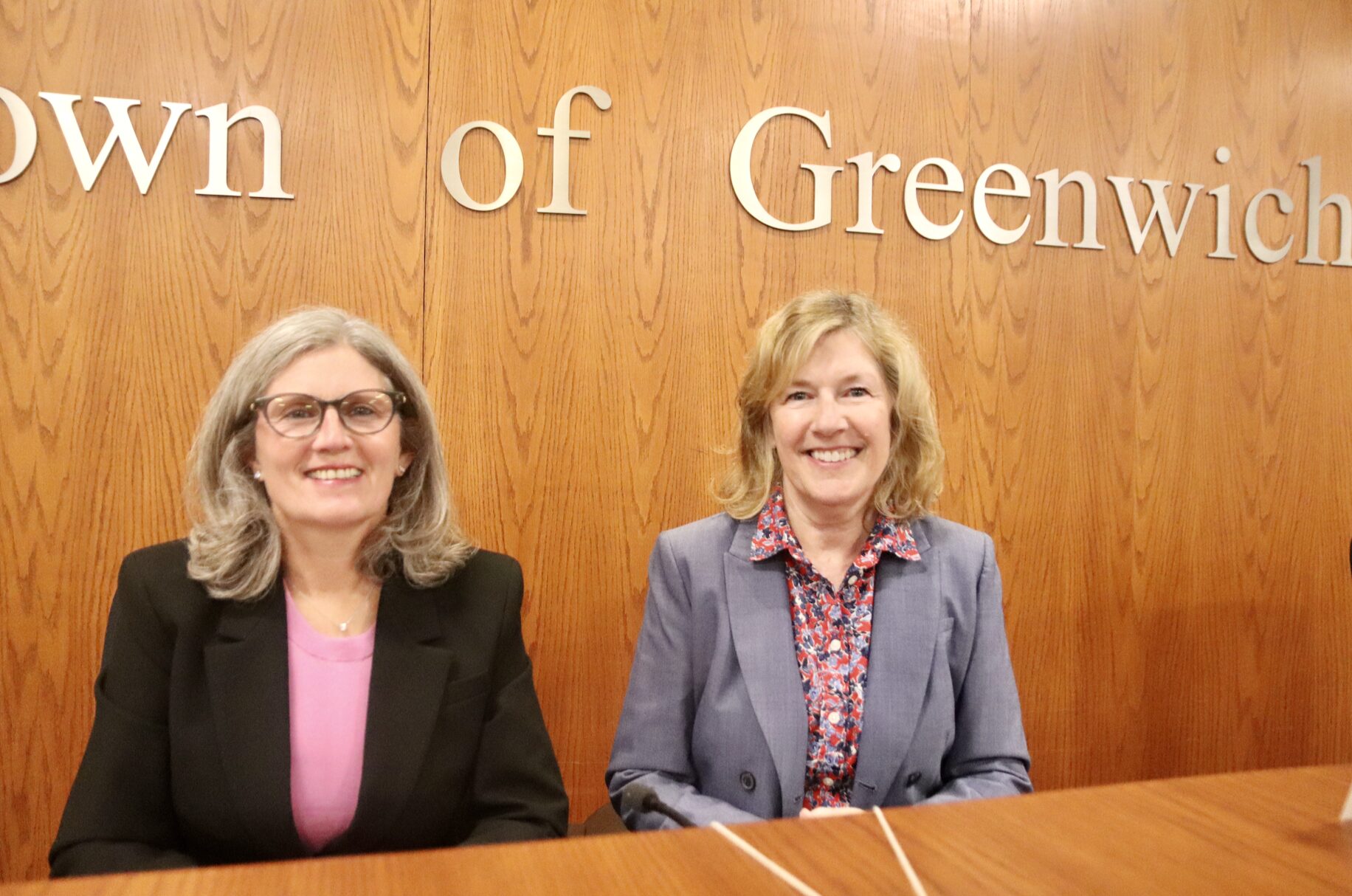
Democratic candidate for Selectwoman Rachel Khanna (left) Republican incumbent Selectwoman Lauren Rabin (right.). Sept 29, 2025 Photo: Leslie Yager
The first half of the debates featured former 149th district State Rep Rachel Khanna who is challenging Republican incumbent Selectwoman Lauren Rabin.
Khanna said she was a 25-year resident who raised four daughters in town where they attended Greenwich Public Schools. She served on RTM for two terms prior to being selected as State Rep.
“I’m the only person in this room who brought back millions for the district: $20 million for Central Middle School, $6.5 million for the Glenville corridor traffic safety project, and $400,000 for the Greenwich Library elevator upgrades.”
“I know how to get things done,” she said. “I will continue to fight for our town to improve the quality of life and safety for our residents.”
Selectwoman Rabin said, “Over the past six years I’ve worked every day to keep our town strong, keeping taxes affordable for all, making our neighborhoods safer, supporting our schools and supporting the qualities that make Greenwich special. I know how to get things done because I’ve been doing it, not with headlines or partisanship or but with collaboration and results residents can see and feel.”
Asked about the 2023 LWV capital project study committee that had recommended town officials create a multi-year capital plan, Khanna said she supported the recommendation.
“I think we’ve had a failure of leadership in identifying and prioritizing capital projects. We have urgent infrastructure needs we have to address. Putting our head in the sand is not going to solve the problem,” she said, giving the Grass Island wastewater treatment plant as an example.
“The DPW told the BET they needed $60 million to harden the plant and protect it from sea level rise. The BET cut the item from the budget. Can you imagine if that plant shuts down?”
Khanna said the LWV capital project recommendations identified projects amounting to $1.6 billion.
“That’s a lot of money, but we can’t just put our head in the sand and pretend these projects will go away,” Khanna said.
Ms Rabin said when she served on the BOE they created a 15-year plan and she supported doing so on a town wide basis as well.
“I don’t know if I would characterize it as putting our heads in the sand,” she said. “I think we can collaboratively work together. We seem to be in silos. Not just the office of First Selectmen. It’s the administration and our school system. It’s the BET….We have to have a way of vetting priorities and what goes first. It’s not just a money issue. Yes, we can raise taxes and borrow money, but it’s also in execution and do we have the human capital to execute the projects?”
Asked what they believed to be the town’s most important challenge, Ms Rabin said while traffic was a challenge, she believed mandates from Hartford that would require the town to build thousands more residential units would worsen traffic.
“If you look at ‘Live Work Ride’ – something that my opponent supported when she was a State Representative – that is adding units next to public transit. The unique thing about Greenwich is we have four train stations…If we were to add about 3,000 units, that would be another 4,500 cars.”
“I think it’s keeping things in a less dense environment, adding sidewalks, bike paths, doing things for distracted drivers and speeding,” Rabin said.
Ms Khanna pushed back, saying, “My opponents have tried to paint me as someone who opposed local control, but that’s just not true and I have the voting record to prove it.”
“With reference to the Work Live Ride bill in 2024, when the bill was moving through the House and was going to pass, I worked with colleagues and local zoning experts to help craft language to help protect local control and make the bill better for Greenwich.”
Khanna said the town’s most important challenges were traffic and pedestrian safety, flood prevention and public schools.
She said as a triathlete she had observed herself how unsafe Greenwich’s roads can be.
“While I was State Rep I took the initiative to secure $6.5 million for the stalled Glenville corridor project. This project was languishing. I saw a need and was proactive in working with partners at the state and local level to secure the funding to make it a reality.”
She said she also secured funding for pedestrian safety improvements at the intersection of Rte 1 and Byram and Pemberwick Roads.
“Our town leadership has stood on the sidelines as funding for projects has been cut by the BET.”
Khanna added that 100-year storms were recurring with increasing frequency and intensity, and flood prevention should be addressed proactively.
She said Greenwich’s leadership didn’t “wake up” until there was terrible flooding in Pemberwick.
Ms Khanna said she was angry and frustrated that the BET “cut” the school budget by $4 million and “town leadership was silent.”
“Great public schools are the foundation of a vibrant community and protect what is our biggest investment: our homes.”
Khanna said the Selectwoman can and should be a strong voice supporting public schools, especially during the budget development process.
“I’m not going to be quiet when the BET runs a chainsaw through the Greenwich Schools budget,” she added. “Our town leaders pretend there was no cut. They denied it even happened.”
Ms Rabin said explained why the Glenville project was had been delayed.
She said she had on the Glenville beautification project team when the corridor project was originally proposed, and her group raised $500,000 to be earmarked as a gift to the town for nicer streetlighting.
“The DPW went out to bid and the bids came in higher,” Rabin explained. “Covid was happening in 2022. CT DOT asked them to wait another year and we did. Bids came in higher. Therefore the town needed more money from the state. Thank you Rachel for what you did from the State, but it was a much bigger effort with a lot more people involved, and DPW is doing all the leg work for that project.”
She said that as Selectwoman, she has for six years been chief elected officer to Western Council of Governments, meeting monthly with 16 neighboring municipalities to share ideas.
She said she was also on the board of KIRMA – CT Inter Risk Management Association – which is where most municipalities get their workman’s compensation and other insurance.
“That helps me understand what’s going on in neighboring towns. And I have the benefit of having Fred Camillo being my running mate. Fred served 11 years in the legislation.”

First Selectman Candidates: Anthony Moor (D) & Fred Camillo (R) debated at town hall 8:00 to 9:00pm. Sept 29, 2025 Photo: Leslie Yager
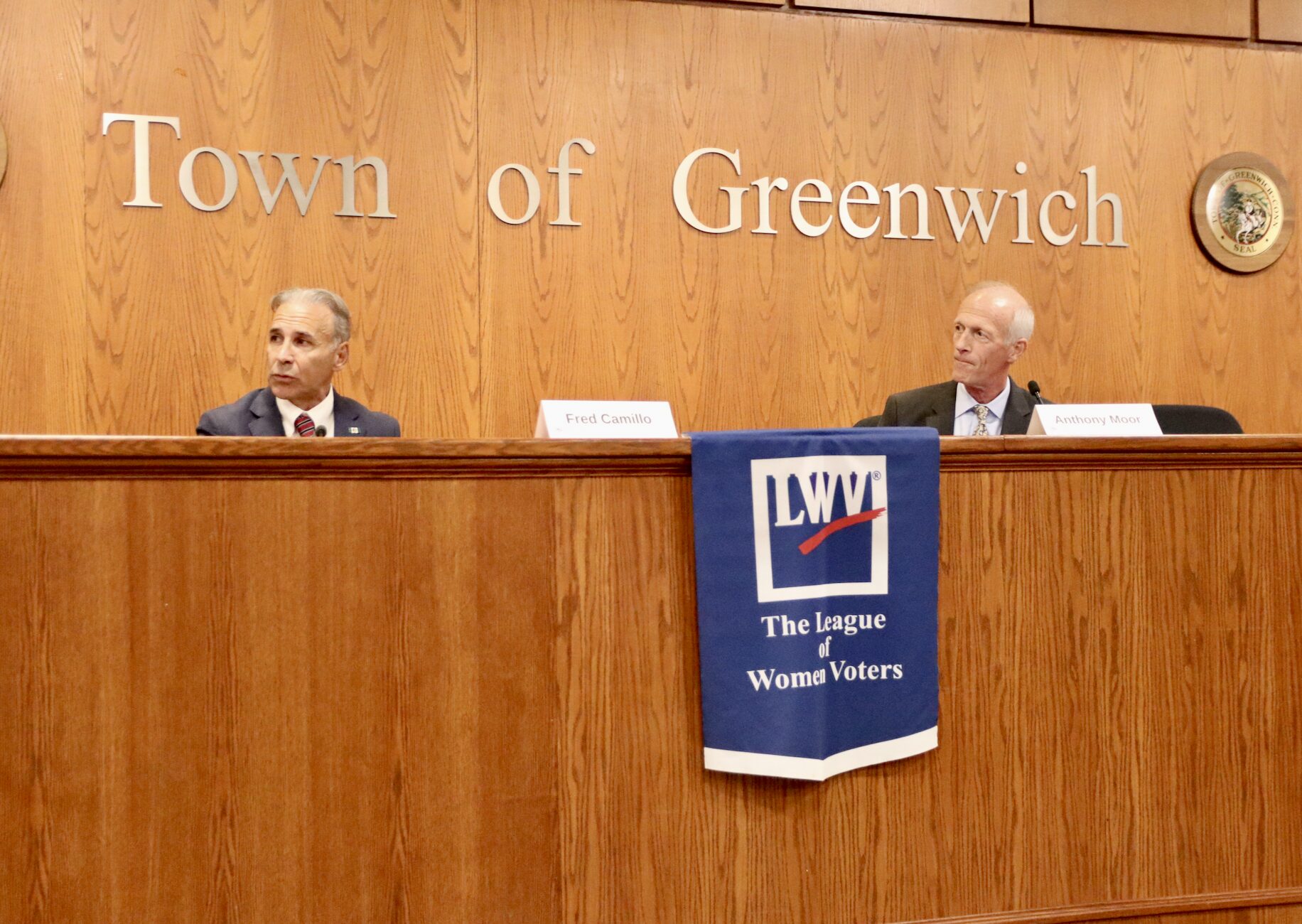
First Selectman Candidates: Anthony Moor (D) & Fred Camillo (R) debated at town hall 8:00 to 9:00pm. Sept 29, 2025 Photo: Leslie Yager
Candidates for First Selectman were asked about political division and partisanship.
Mr. Camillo said he’d been sincere when he signed a civility pledged and had created an anti-Semitism task force and cited his appointment of Democrat Howard Richman to fill vacancy on the Board of Assessment Appeals that could have gone to a Republican.
He said after serving 3-1/2 terms on RTM and 11 years as State Rep in Hartford it was important to lead by example.
“But it’s tough today,” he said.”You see the violence and people getting shot just for their thoughts.”
Mr. Moor said the First Selectman should be the model of politics that fosters collaboration and constructive dialogue.
As a member of the RTM and chair of the Transportation committee, he said, “We’ve had a broad coalition, who have been able to work in a non-partisan way.”
However he said, “Elbows have gotten sharper. The most partisan thing that happened this year was that cut to the schools. It took place in the dead of night, without any dialogue, any consultation and no due diligence. It was a shock.”
“It was not bi-partisanship. It was one-party rule,” Moor added. “It left a bitter taste.”
Camillo insisted there was not a “cut,” but rather less of an increase than requested.
“They requested $12.1 million and received $8.1 million. That’s a 3% increase. Most of the departments under me stick to a 2% increase. And then we found out later that there was a law that allowed them to carry over a surplus which reached $2.5 million.”
“There was a dialogue…If they had taken my compromise they would have ended up with more money. I will agree that it was done late. Communication is key. That’s why, with the new BET coming in, I supported the people, they will work well with the Democrats.”
Mr. Moor added, “I’m just an astro-physics major but when a budget is set by a school board on a bi-partisan vote and sent over to a vote on the BET and the BET removes numbers from it, it’s a cut. And the teachers know it was a cut because they got cut.”
“It was not a cut,” Camillo repeated. “We agree in principal that communication was terrible and I’ve spoken to members coming onto the BET and they’ve all pledged that that will not happen again.”
Asked how they would improve traffic conditions in Greenwich, Mr. Moor said after knocking on 4,000 doors, residents had cited traffic, including both pedestrian and bicycle safety, as a top concern, second to public schools.
He said it was a mistake when a previous administration removed the the position of Superintendent of Traffic Engineers, which neighboring communities do have.
“We saved his $106,000 salary, but we paid the price,” Moor said. “That job’s responsibility was to handle the network of traffic – it’s not like fixing the intersections.”
“That stop-and-go confusion were seeing on Greenwich Ave now that we removed cops and changed the architecture – it’s confusing,” Moor said, predicting Greenwich will have “Carmageddon” on Rte 1 with upcoming bridge projects.
Camillo said the town has far more vehicles registered than in the past, not including the cars from people who live elsewhere and commute to town.
“Whenever you go to a nice place, there’s going to be traffic,” Camillo said, adding that his commute to Hartford as a State Rep initially took 1 hour and 10 minutes, but grew to two hours.”
“We reached out a couple years ago to Connecticut DOT, and Greenwich was the first town to get smart technology at exit 3 of I-95. It doesn’t eliminate traffic, but we can work at mitigating congestion by looking at new and improved technology,” Camillo said, adding that the DOT agreed to provide smart technology from the Port Chester line to the Stamford line within the next 12 months.
“There is a lot more work,” he said. “We’ve put millions of dollars into local infrastructure to increase and improve sidewalks, crosswalks and intersections.”
Camillo said the Selectmen, who serve as the town’s traffic authority, had made efforts to remove “meter-feeders” from Greenwich Avenue.
“It’s still not enough, but it’s a good thing that there’s people going there. A lot of towns would like to have that problem.”
“Havemeyer Hotel”
Asked about proposals to renovate and repurpose the historic Havemeyer building, Camillo said, “This is something that has bothered me since I was a kid. Why are we housing a government entity in one of the most expensive pieces of property in the middle of the commercial district?”
“Why wouldn’t we do a PPP and open that building to the public?” he asked.
He said the two task forces addressing plans for the building had done a great job.
“Right now you can’t go in there unless you have business with the BOE,” he said. “The building is falling apart. There’s been in the past 25 years, there have been two attempts to get them out of there…We’re trying to find them a space.”
He said the task force top choice among RFP responses was to create a hotel and fix up the auditorium for the public, create conference spaces and add a rooftop bar and restaurant.
“Isn’t that better? At 4 o’clock that place goes silent in the middle of your commercial district,” he continued, adding that Greenwich Ave had become vibrant since the pandemic. “The building is going to fail.”
He noted the building is 53,000 sq ft but the school district administration only requires about 19,000 sq ft.
“It is time,” Camillo said. “I’m really excited that sometime in the next two years we’re going to move forward with something there. But we’re looking at places for the Board of Ed…We’re trying to get them into a town building.”
Mr. Moor said the Havemeyer building was a story of vision, leadership and decay.
“It’s clear that we let things moulder and fall apart and then it becomes an emergency. We don’t fix things in Greenwich before they break,” Moor said. “That’s got to stop…You can fix things at an earlier time and it will cost a lot less. The Havemeyer building is believed to be a $28 million fix-up job and I can understand why the First Selectman wants to get it off the books, but as First Selectman I’m not going to sell off our town assets for parts.”
Moor said as First Selectman, “I’m not going to have a secret RFP process sent out to business people, and have them come back, and then ask a secret group of citizens to decide which thing to build, which is what happened and we ended up with the idea of a hotel.”
“We want to bring the Havemeyer building back to the people who live in Greenwich, not to the people who don’t live in Greenwich.”
Moor said the process should be public and open, and culminate in an RFP.
Camillo joked, “If it was a secret process, then I would not be good in espionage. It was very open.”
“Sometimes people might like what comes out of (the RFP process) and say it was a backroom deal,” Camillo said, suggesting that someone had submitted FOI requests for information on the task force and their RFP, at expense to the town.
“There was nothing secretive. In fact there was a public hearing.”
“All I know is that it was a surprise to just about everyone in town that it was going to be a hotel and not, ‘Hey, there’s some ideas.’ I would start in a different manner,” Moor said.
Camillo said the Havemeyer task force, on their own, issued the RFP.
“That’s what came back,” he said.
Mr. Moore said he would have recommended a design charrette rather than issuing an RFP at the outset.
“I think we all agree that Greenwich Avenue has a great opportunity with the Havemeyer building. We’re not going to kick the BOE out and then tack on another $3 million a year in rent,” Moor said.
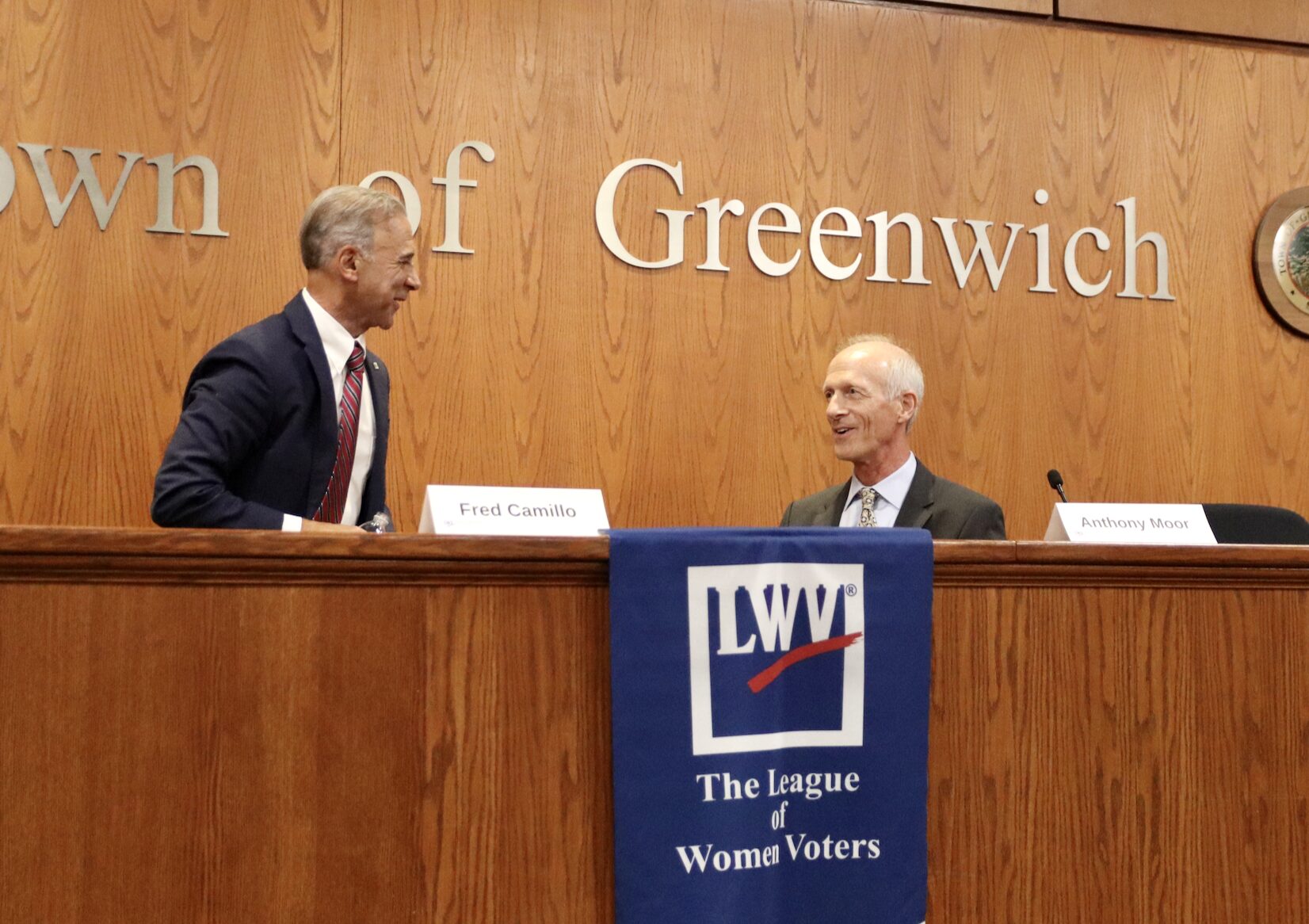
First Selectman Candidates: Anthony Moor (D) & Fred Camillo (R) debated at town hall 8:00 to 9:00pm. Sept 29, 2025 Photo: Leslie Yager
Public-Private Partnerships, prioritizing Capital projects, CIP Process
Moor’s argued that under a century of Republican leadership taxes were low but fiscal responsibility was lacking.
“Greenwich has kept the illusion of low taxes by deferring maintenance and capital projects long before Fred and I were adults. That is how we have managed to keep our tax rates so long, and at a certain point – we’re getting to that point – we discover there is all this stuff we need to take care of,” Moor said. “We are in that moment now. We need to bring in a new era of fiscal responsibility.
“Pay as you go is a bad way to be doing large capital projects,” Moor said. “Nobody buys their house all at once unless they won the lottery. You buy it over 30 years. Every other municipality in the US does it this way.
He said longer term bonding was the most cost-effective way to finance projects and that if that had been done for Central Middle School, the town’s cash flow would be greater.
“On a partisan basis, we’ve said let’s pay as you go. I don’t think that’s smart,” Moor said.
Camillo said he did not wan to “pile debt on the next generation.”
“I think there is a way to get these projects done and to keep taxes affordable,” he said, emphasizing that a third of residents fell into the “ALICE” category – asset limited income constrained and employed, and that 1/4 of children in town qualify for free or reduced lunch.
“Greenwich has a Dementia-Friendly designation and an age friendly designation in the state. We want to keep it that way.”
“None of that will change by putting a school (project) on a 20-year bond,” Moor said.
Moor said that while he would always pursue private money from generous and fortunate residents to build great projects, PPPs and naming rights should come after a planning process, rather than determining priorities.
“I’m concerned we’ve started to outsource our planning and prioritization of that policy, to the extent that we have one. It’s a little like letting your brother-in-law planning the family vacation and ending up at the World’s Largest Ball of Twine, where no one wanted to go.”
“We could have built the Eastern Greenwich Civic Center decades earlier had we gotten gumption to do it ourselves. It would have cost a lot less because we could have gotten money for practically nothing, and I bet we could have also gotten a donation for naming rights in the end.”
“Instead we waited until a time when suddenly prices of everything was going up – from construction materials to money itself.”
Moor suggested the town needed a strategic prioritization process for capital projects planning.
“I know my opponent felt that a 15-year capital planning process was not effective and couldn’t be nailed down,” he said. “So now we’re doing 5-year plans, but even five year plans are not happening right now. We’re seeing our most recent sessions in the lat two BET terms our strategic capital budget being erased of plans that we know we’re going to have to do.”
He listed crucial flood drainage improvements to the rink.
“They’re getting erased, not from this year’s capital plans, but from future capital plans,” Moor said, citing the planning process used by former First Selectman, Jim Lash. “There was a planning process that used a rubric to prioritize how we develop different projects, their importance and the order they should be done – and it may change over time.”
Camillo said Mr. Lash’s process hadn’t worked because department heads each touted their own projects, that Greenwich has decentralized form of government that deprives the First Selectman of power.
He said the 15-year CIP process had been flawed.
“It was good but it was also flawed because after six or seven years it is outdated.”
He that change would require charter change which is a “big lift” and the town might have a BET with “a different mindset.”
“I am a lot more confident in the BET going forward,” he said, a reference to his having endorsed an alternate BET slate of six candidates, who were victorious in a primary a couple weeks ago.
“I do support the low mill rate. You never want to get rid of that. I helps people stay here on fixed incomes. It’s also a draw for people coming here. But you got to get projects done. You have to stay on top of the infrastructure. That’s why we fight for grants. That’s why we fight for public-private-partnerships – to give taxpayers relief,” Camillo said.
And he warned the BET can “decimate” the First Selectman’s budget proposal.
“If my opponent is sincere about that and I think we agree in principal – is you need charter reform because you don’t have that power.”
Regarding PPPs, Camillo said, “Every town I’d go to down south I’d see some of these towns, and there were beautiful buildings done really tastefully with private names on it. And that gives taxpayers relief.”
He said in 2019 he heard from Alexandra Cohen with an offer of private funding from the Steven & Alexandra Cohen Foundation for what is now the Cohen Eastern Greenwich Civic Center, and that the town created a Naming Policy in 2022.
But he added that when his agenda that included a proposal to redo Roger Sherman Baldwin Park and relocate the DPW work shed located away from the waterfront, the BET, which he described as the most powerful board in town, “decimated that.”
He said it was important to be prepared to pivot in unanticipated situations, giving examples of the pandemic and historic flooding.
Mr. Moor said property owners appreciated the low mill rate – lowest in the state with the exception of Salisbury – but that planning process didn’t cost money.
“This role has the ability just by being First Selectman to convene people, get groups together and to negotiate collaboratively,” Moor said.
Relationship Between BOE and BET
Mr. Moor said he was concerned about “excess litigation in recent years,” and that should be a last resort since it is very expensive.
“I will never sue the school board. I just won’t do that,” Moor said.
“The Democrats on the BOE elected a Republican, and that was the requirement of the charter,” Moor said. “This could have been resolved, but instead, a half million dollar charge for lawyers that we didn’t need to take on.”
Second, Mr. Moor said he would not sue a police officer who puts out a sign on his lawn that says bad things about him, a reference to an incident with former Greenwich Police Captain.
Third, he said, “As our First Selectman I would not conduct a fourth investigation on a school administrator who is accused and then in 3 other investigations – two by the state and one by the schools – to have done nothing wrong. That cost $346,000.”
That was a reference to the flap over a Project Veritas under cover investigation of an administrator at Cos Cob School in 2022.
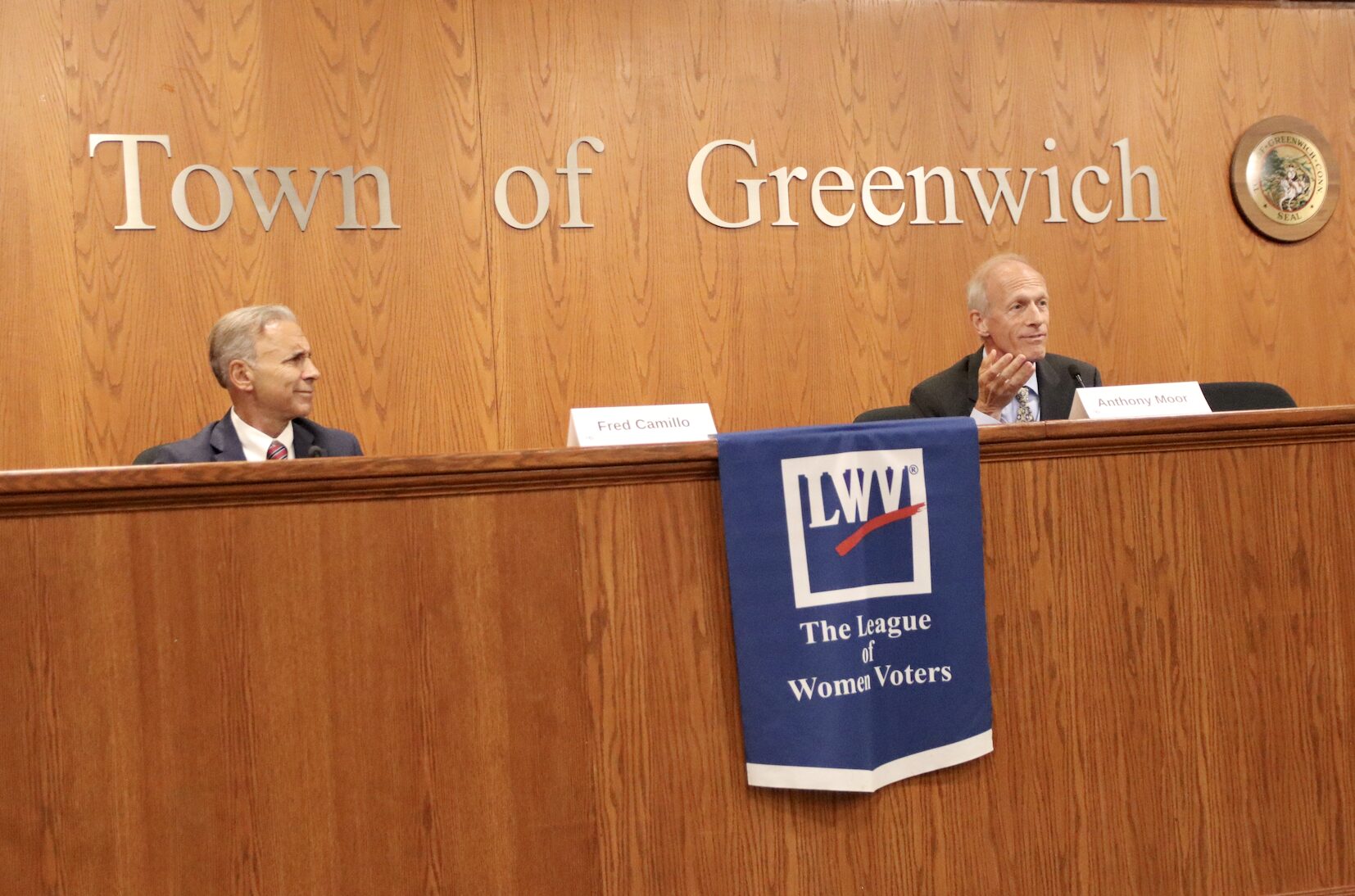
First Selectman Candidates: Anthony Moor (D) & Fred Camillo (R) debated at town hall 8:00 to 9:00pm. Sept 29, 2025 Photo: Leslie Yager
“I’m shocked that you brought up those three things,” Camillo said.
“Number one, the cop that was fired, and not by me, sued us,” Camillo said. “We didn’t sue him.”
That situation stems back to the morning of October 25, 2019, October 25, 2019, when during Camillo’s first campaign for First Selectmen red and white lawn signs appeared among other local candidate campaign signs, saying, “Local Elections Matter” and “Trump/Camillo…Make Greenwich Great Again.”
Eventually Captain Mark Kordick admitted responsibility for the signs and he resigned in 2020 after Police Chief Heavey announced he planned to terminate him.
Kordick did sue the town, citing his first amendment rights. Judge Krumeich issued a MOU on the case at the end of 2022. Ultimately the Town settled with Kordick for $650,000.
Second, he said it was not true that he sued the Board of Education.
“A Democratic member and Republicans came to me because they knew that after 30 days, if they didn’t fill the vacancy of Karen Kowalski (who resigned) that it comes before the Board of Selectmen. The knew that and then they played dumb because they didn’t do that,” she said. “Thirty days. Took them 96 days and the Republicans had 3 different candidates – they couldn’t agree. Finally they agreed on one, and they said for the first time in history the BET and BOE did not honor the choice of the party that had the resignation. That is fact. And they picked a Republican, I guess, what they call a Republican in Name Only, a RINO.”
Camillo said he had to protect the process and needed to hire outside counsel.
“A moderator of the RTM supported that,” he added. “I defended the process.”

First Selectman Candidates: Anthony Moor (D) & Fred Camillo (R) debated at town hall 8:00 to 9:00pm. Sept 29, 2025 Photo: Leslie Yager
In closing remarks Mr. Camillo said when he and Rabin took office in 2019 they would respect and cherish tradition in town and marry it with a bright vision.
“We’ve done that, in spite of the fact that we’ve run into some of the most challenging events of the last 120 years of our nation. Whether it’s a 100 year pandemic or 500-year flood, we’ve looked for opportunities to come out of it.”
He listed accomplishments to include creation of an energy policy, creation of EMAC, establishment of a sustainability committee, purchase of hundreds of acres of open space through PPPs, keeping the mill rate lowest in the state, starting a weekly e-blast and social media channels, fighting for local control, increasing town affordable housing stock by 15% without a state mandate, and the hiring of an emergency management director.
Mr. Moor said that as he did as a journalist, he would earn trust by listening and acting.
“I know it takes time to build trust, but I hope that after this session I’ve made the case for a new era of fiscal responsibility and leadership, and if you entrust me and Rachel with your vote we will take that pact to public office and we will listen, lead and act,” he said.
The next set of debates organized by the LWV Greenwich will be among Board of Education candidates on Monday, October 6 from 7:00pm to 9:00pm. It will again be moderated by Mr. Presta, who will be assisted by a local high school student.
See also:
League of Women Voters of Greenwich Announces Candidate Debates 2025